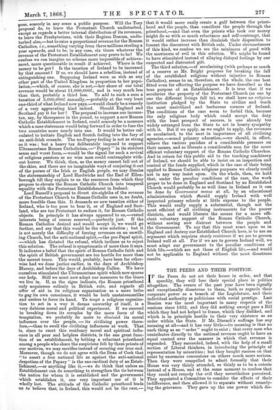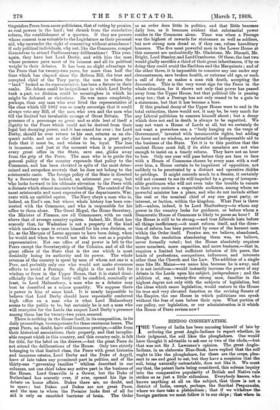THE PEERS AND THEIR POSITION.
"IF the Peers do not set their house in order, and that 1 speedily, they will lose their special place in politics altogether. The events of the past year have been signally and exceptionally disastrous to them, both as regards their corporate power as a branch of the Legislature, and their individual authority as politicians with social prestige. Last Session was the most important in many respects of the sessions since 1832, and they did nothing except pass a Bill which they had not helped to frame, which they disliked, and which is in principle hostile to their very existence as an order within the State. If Mr. Disraeli's suffrage has any meaning at all—and it has very little—its meaning is that no such thing as an " order " ought to exist ; that every man who contributes directly to the national revenue ought to have an equal control over the manner in which that revenue is expended. They succeeded, indeed, with the help of a small section of Liberal thinkers, in introducing the principle of representation by minorities ; but they bought success on that point by enormous concessions on others much more serious. Then they were compelled to admit formally that their House was very thinly attended, so thinly as to be a coterie instead of a House, and at the same moment to confess that they could not remedy the evil they nevertheless perceived. They appointed a Committee to consider the effects of their indifference, and then allowed it to separate without remedy- ing the grievance. They gave up the one power which dis- tinguishes Peers from mere politicians, that of voting by proxies, as real powers in the land ; but shrank from the correlative reform, the establishment of a quorum. If they are powers whose consent is as valuable to the Legislature as their personal aid, why surrender the right of consenting without attendance if only political individuals, why not, like the Commons, compel themselves to attend Parliamentary deliberations This year, again, they have lost Lord Derby, and with him the man whose presence gave most of its interest and all its political weight to their debates. It has been no slight advantage to the Peers that for twenty-two years, for more than half the time which has elapsed since the Reform Bill, the true and accepted chief of the Tory party, the man to whom the " land " looked as its representative, has been a fixture in their ranks. No debate could be insignificant in which Lord Derby took a part, no division could be meaningless in which he might be defeated or victorious. He was more completely, perhaps, than any man who ever lived the representative of the class which till 1867 was so nearly sovereign that it could always veto any Bill, of the men who own and the men who till the limited but invaluable acreage of Great Britain. The presence of a personage so great and so able lent of itself a dignity to the Peers which could not be derived from their legal but decaying power, and it has ceased for ever ; for Lord Derby, should he ever return to his seat, returns as an elo- quent noble, and not as the chief to whom a great party feels that it must be, and wishes to be, loyal. The loss is immense, and just at the moment when it is perceived every great office in the State, save one, glides away from the grip of the Peers. The man who is to guide the general policy of the country expounds that policy to the Commons, and has been elevated in spite of the most, deter- mined and outspoken avowals that he does not belong to the .aristocratic caste. The foreign policy of the State is directed by a Secretary who is, indeed, an aristocrat pur sang, but "who looks forward to his ultimate elevation to the Peers with n distaste which almost amounts to loathing. The control of the most aristocratic and most expensive of the departments, War, zeds with an untitled squire. The Navy obeys a man who is, indeed, an Earl's son, but whose whole history has been con- nected with the Commons, and who is responsible for his office to them alone. The Great Mogul, the Home Secretary, the Minister of Finance, are all Commoners, with no rank -above that of average country squires. Indeed, Mr. Hunt has scarcely that, for Wadenhoe is not a property of the kind which enables a man to return himself for his own division, or fix, as the Marquis of Lorne appears to have been doing, when he would and when he would not take his seat as a popular representative. Not one office of real power is left to the Peers except the Secretaryship of the Colonies, and of all the great offices of the State that is the one which is most decidedly losing its authority and its power. The whole revenue of the country is spent by men of whom not one is a Peer, and probably only one who would not make strenuous efforts to avoid a Peerage. So slight is the need felt for wisdom or force in the Upper House, that it is stated demi- officially the lead of that body will be confided, nominally at least, to Lord Malmesbury, a man who as a debater may best be described as a minus quantity. We suppose there is power in him of some kind. It is nearly impossible to believe that Lord Derby should have repeatedly conferred high office on a man who is what Lord Malmesbury seems to the public to be, but certainly he is not a man who will reacquire for the Lords the respect Lord Derby's presence among them has for twenty-two years. secured.
There is nothing in the House itself, in its composition, in its daily proceedings, to compensate for these enormous losses. The great Peers, no doubt, have still immense prestige,—alike from their historical associations, their property, and that inexplic- able respect which in this country, and this country only, is felt for title, for the label on the drawer,—but the great Peers do not attend the deliberations of the House. Only two strictly belenging to that limited class, the Peers with great histories and immense estates, Lord Derby and the Duke of Argyll, have of late taken any prominent part in politics, and of the thirty-one "governing families" whilom described in our columns, not one chief takes any active part in the business of the House. Lord Granville is a Gower, but the Duke of Sutherland has scarcely ever, if ever, opened his lips in debate on home affairs. Dukes there are, no doubt, and to spare ; but Dukes gucl Dukes are not great Peers, and the man to whom the Premier looks first of all for aid, is only an ennobled barrister of brain. The Order
as an order does little in politics, and that little becomes daily less, as it becomes evident that substantial power resides in the Commons alone, Time was when a Peerage was the highest of rewards for statesmen as well as soldiers, but now strong men dread or, if they can, refuse hereditary honours. The five most powerful men in the Lower House at this moment are undoubtedly Mr. Gladstone, Mr. Disraeli, Mr.
Bright, Lord Stanley, and LordCranborne. Of these, the last two would gladly sacrifice a third of their great inheritances, if by so- doing they could avoid the Earldom and the Marquisate ; and of the other three, it is impossible to conceive any one under any circumstances, save broken health, or extreme old age, or such a call of duty as makes a man risk death, accepting the- decoration. This is the very worst sign for the Peers in the- whole situation, for it shows not only that power has passed, away from the Upper House, but that political life is passing away too ; that a Peerage has not only ceased to be a gain to. a statesman, bat that it has become a bore.
If this gradual decay of the Upper House were to end in its total extinction, there would not, it may be, be very much for any Liberal politician to concern himself about ; but a decay which does not end in death is always to be regretted. We may not want a House of Lords at all, but we certainly do- • not want a powerless one, a "body hanging on the verge of Government,' invested with innumerable rights, but adding- no force and no wisdom, no substantial or indispensable aid to- the business of the State. Yet it is to this position that the ancient House must fall, if its abler members are not wise- enough to insist on a timely reform. They have not an hour- to lose. Only one year will pass before they are face to face with a House of Commons chosen by every man with a roof' over him, a House certain to be impatient of opposition, not unlikely to be penetrated by a distinct and operative dislike- to privilege. It might concede much to a Senate, it certainly will not consent to see its will impeded by a group of irrespon- sible gentlemen who will not even take the trouble to ensure- to their own orators a respectable audience, among whom no- powerful minister has a place, and who do not include either- the real or the nominal chief of any one great party, or interest, or faction, within the kingdom. What Peer is there left—unless, indeed, it be Lord Shaftesbury—to whom any power in the country looks for guidance, or before whom a Democratic House of Commons is likely to pause an hour ?
the House is still to be strong,—and true Liberals hate before- all things inefficiency,—it must reform itself, and the direc- tion of reform has been perceived by some of the keenest men- within the Order itself. Proxies are, we believe, abandoned,.
though the resolution abandoning them was, we believe, never formally voted ; but the House absolutely requires. more members, more capacities, and more business,—that is,
requires a limited but sufficient infusion of life peers, the
of professions, oocupations, influences, and interests- other than the Church and the Law. The addition of a single- man like Mr. Maine—we name him because he is away, anti it is not invidious—would instantly increase the power of any debate in the Lords upon his subject, jurisprudence ; and the- addition of, say, twenty-five strong men, familiar in the- highest degree not only with the subjects of legislation, but, the ideas which cause legislation, would restore to the House- its true and very elevated function as the revising Senate of the Empire, the one House in which politicians can speak without the fear of man before their eyes. What portion of our policy, our legislation, or our administration is it which. the House of Peers revises now?



































 Previous page
Previous page